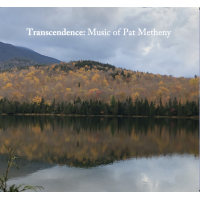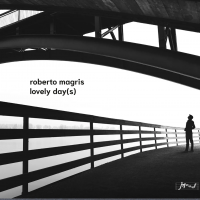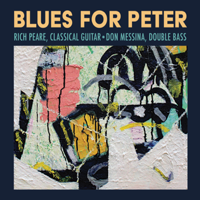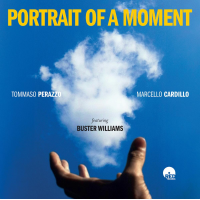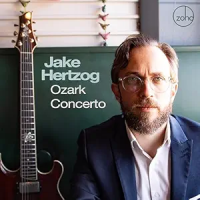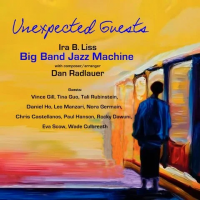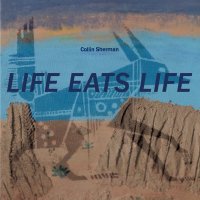Home » Jazz Articles » Multiple Reviews » Dave Douglas: Greenleaf Portable Series, Volumes 1-3
Dave Douglas: Greenleaf Portable Series, Volumes 1-3


John Zorn
saxophone, altob.1953

Wayne Shorter
saxophone1933 - 2023
Later, with a multi-year major label deal inked to allow him the freedom he demanded with the distribution he deserved, Douglas worked projects from the accordion-driven chamber-jazz of his Charm of the Night Sky group and A Thousand Evenings (RCA, 2000), and the early electro-acoustic experimentation of Freak In (RCA/Bluebird, 2003), to a quintet that, starting with The Infinite (RCA/Bluebird, 2002), took trumpeter

Miles Davis
trumpet1926 - 1991

Joni Mitchell
vocalsb.1943
In the second decade of this new millennium, Douglas continues to pull out the stops, and with the introduction of his independent Greenleaf imprint, has been a quick adapter to technological and industry shifts, releasing an unprecedented (at least in jazz) series of live performances in digital-only form, including the quintet of The Infinite, his groove-heavy electric Keystone group and, more recently, Brass Ecstasy, a quintet that, in part, pays tribute to the late trumpeter,

Lester Bowie
trumpet1941 - 1999
It's a strange world, indeed, where response to a download-only release has been so successful that it has actually encouraged the artist to issue the music in hard media form. At a time when CDs are, if not threatened with complete extinction, certainly no longer the income-booster they used to be, 2011 has seen Douglas' Greenleaf Portable Series (GPS) morph from a download-only project to a three-CD box, Three Views, that collects the series' first three releases, each from a different group , including the three year-old Brass Ecstasy (Rare Metals), a nascent quintet with saxophonist

Ravi Coltrane
saxophone, tenorb.1965

Vijay Iyer
pianob.1971
Each of the GPS sets reflects a different side of Douglas' approach to playing, writing and band-leading, building on a body of work that's remarkable for its size, depth and breadth. Rare Metals presents a set of newly written music for Brass Ecstasy, while Orange Afternoons represents a return to completely acoustic music, and Bad Mango the kind of intrepid, out-of-the-box thinking that's become de rigueur from an artist responsible for daring records such as Witness and Parallel Worlds (Soul Note, 1993). With so many projects on the go, it be completely understandable if Douglas were to somehow begin repeating himself—and yet, with nearly 40 titles under his own name since 1993, representing more than a dozen groups not including the one-offs, Douglas continues to create groups for whom the only link thread is the trumpeter's writing, and a playing style that clearly adapts to any context while remaining resolute and unmistakable.
Chapter Index
 Dave Douglas & Brass Ecstasy
Dave Douglas & Brass EcstasyGreenleaf Portable Series Volume 1: Rare Metals
Greenleaf Music
2011
Rare Metals starts the Greenleaf Portable Series on a familiar note, if only because Douglas has been working with Brass Ecstasy since late 2008, releasing its first album, the CD/DVD combo Spirit Moves (Greenleaf) in the summer of 2009, in time for the summer festival season, making a hot and flat-out fun stop at the 2009 Ottawa Jazz Festival.
As much as Brass Ecstasy evokes the buoyant party-down vibe of a New Orleans brass band, the writing and freedom of interaction are more reminiscent of Lester Bowie's The Great Pretender (ECM, 1981) and, with the late trumpeter's equally left-of-center Brass Fantasy group, Avant Pop (ECM, 1986). Like Bowie, Brass Ecstasy mixes original music with covers, in the case of Spirit Moves, Otis Redding's and Steve Cropper's soul classic "Mister Pitiful" and country icon Hank Williams' "I'm So Lonesome I Could Cry." Like Bowie, Douglas eschews a conventional rhythm section for the unorthodox brass front line of trumpet, French horn, trombone and tuba, though the late trumpeter's group was often larger.
As good as Brass Ecstasy was in the studio, it has proved an even better live act, and in the past two years Douglas has not only released a live CD, United Front: Brass Ecstasy at Newport (Greenleaf, 2011), he's also made four live shows, from a 2008 date at New York's Jazz Standard, available in download-only format. But, barring three new originals, all these sets draw from Spirit Moves' songbook. Rare Metals doesn't just inaugurate GPS, it gives Brass Ecstasy a new set of material to play—five Douglas compositions and a gentle reading of

Billy Strayhorn
piano1915 - 1967
Douglas' writing gives the group plenty of freedom, from "Town Hall," with a thematic focus and drummer

Nasheet Waits
drumsb.1971

Luis Bonilla
trombone
Marcus Rojas
tubab.1963
"Thread" is another episodic piece that moves from rubato freedom to a loose kind of time, where free passages revolving around some core contexts are rallied through cue-driven motifs, with Douglas taking some spotlight time in a push-and-pull duo with Waits, where the drummer's fiery energy is contrasted by the trumpeter's largely languid but angular lines.
There may be moments of heat and joyous groove, but Rare Metals largely begins to distance itself from the stylistic specificities of Brass Ecstasy's humble beginnings, moving away from the party vibe that made it a better live act than studio one, and turning it into a group that can be appreciated as much from the comfort of a warm seat as it can the sweaty realm of a dance floor.
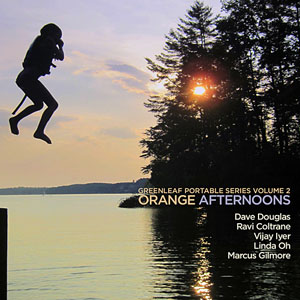 Dave Douglas
Dave DouglasGreenleaf Portable Series Volume 2: Orange Afternoons
Greenleaf Music
2011
It's been a long time since Douglas made a completely acoustic small group recording with a pianist—nearly 12 years, in fact, since Douglas released Soul on Soul (RCA, 2000), his loving tribute to pianist

Mary Lou Williams
piano1910 - 1981
"Solato" begins with a simple, almost singsong motif harmonized by Douglas and Coltrane, and when Iyer, bassist

Linda May Han Oh
bass, acousticb.1984
Overt freedom driven by broad-stroke context-setting may be the order of the day, but this group largely favors careful consideration over reckless abandon. Douglas' solo on the more simmering intensity of "Orologi" builds slowly, almost inevitably after Coltrane's equally inexorable exploration of Oh and Gilmore's loose but ever-present pulse, the trumpeter picking up where the saxophonist leaves off, like grabbing the baton in a relay race. But while the group passes ideas around like a relay, that's where the comparison ends, because there's no sense of urgency. Instead, Douglas's quintet takes its time to patiently go where the music takes it, Iyer's solo seamlessly moving between sharper edges and surprisingly soft melodism.
The entire recording is defined by an unhurried sense of freedom, with only the closing "Frontier Justice" coming in under seven minutes, and four of Douglas' six tunes extending beyond the eight-minute mark. "The Gulf" opens the record on a gentler note, though it's singable melody ultimately ascends to great power, a structure that repeats again when Douglas takes his first solo of the disc, the solo front man at first, but ultimately joined by the rest of the group for some collective free play, but this time without losing the song's basic structure, both rhythmically and in its adherence to the changes, though they're taken to such far-reaching places that it's sometimes easy to lose sight of them.
Of the first three GPS sets, Orange Afternoons is, perhaps, the most exciting, because it represents a new group venture for Douglas that's filled with the same kind of promise as first recordings by the quintet of The Infinite, Keystone (Greenleaf, 2005) and Charms of the Night Sky (Winter & Winter, 1998). With Iyer, Coltrane and Oh leaders in their own right, let's hope that it'll be possible to keep this group going, as Douglas' history has demonstrated that as good as his ongoing groups' first recordings are, they just keep on getting better and better.
 Dave Douglas & So Percussion
Dave Douglas & So PercussionGreenleaf Portable Series Volume 3: Bad Mango
Greenleaf Music
2011
For the third and final release in this first round of Greenleaf Portable Series sets, Douglas counters the easy accessibility of recent recordings with Keystone, his Quintet and Brass Ecstasy—even Orange Afternoons—with one of his most overtly experimental releases since 2001's Witness, a daring song-cycle that blended acoustic and electronic instrumentation with some of the trumpeter's most fearlessly forward-thinking writing. It's no surprise, then, that amidst five newly composed pieces for his collaboration with new music percussion ensemble So Percussion, Douglas reprises two pieces from Witness—the pulsating "One More News," which opens Bad Mango, and the lengthier title track to his 2001 recording, which acts as both a centerpiece and highlight of this relatively brief release of just under 36 minutes.
The entire GPS series favors brevity, with Orange Afternoons the longest at 49 minutes and Rare Metals also clocking in at a little under 36 minutes. But quality over quantity is clearly the mantra here, and if all three releases paint a collective picture of Douglas as an artist with a seemingly endless flow of ideas, then Bad Mango finds him thinking well outside the box. So Percussion has interpreted minimalist co-founder

Steve Reich
composer / conductorb.1936
There've been some changes to So Percussion's lineup since Amid the Noise, with co-founders Adam Sliwinski and Jason Treuting now joined by Eric Beach and Josh Quillen, but the multi-instrumental wizardry of the group—in addition to tuned and unturned percussion, employing synthesizers, organ, melodica, musical saw and the catch-all that is described as "toys"—remains intact, providing far more potential than what, on paper, could sound somewhat monolithic (trumpet and percussion). To be sure, Douglas engages in some trumpet-and-percussion interplay during his incendiary solo on "One More News"—certainly one of the hottest moments across the three GPS sets—but in the setup of that song's context, Quillan's sinewy, fourths-driven synth provides chordal support, while Sliwinski doubles the trumpeter's theme on marimba, the whole thing driven by Treuting's drum kit work and Beach's toys. As effortlessly skilled at handling complex scoring as So Percussion is, based on what's going on behind Douglas' solo, it's clear that its four players are equally comfortable in an improvisational setting.
If percussion seems, on the surface, to be a somewhat limited palette, So Percussion proves it to be anything but, providing the same rich, orchestral tapestry as on Amid the Noise. The original "Witness " also featured tuned percussion (

Bryan Carrott
vibraphoneb.1959
As successful as these two reworks are, the new music is even more successful, if only because it was composed with So Percussion in mind. The title track pushes forward, again with marimba doubling Douglas' at times grittier horn, intensifying over nearly six minutes to more chaotic drumming and some overdriven sonics coming from Beach and Quillen. "Nome" is a brief miniature of otherworldly sonics, Douglas' sketch of a composition revolving around only the barest suggestion from his horn, while the similarly brief "Spider" is a tad more centrist, as Douglas' simple, lyrical line hovers gracefully over a shifting landscape of organ, drums, percussion and sundry toys.
As intrinsically experimental as Douglas' first encounter with So Percussion is, Bad Mango is surprisingly approachable, for all its outrЁҰ contexts and sound worlds. Perhaps that shouldn't really be a surprise from Douglas, an artist who may think on the broadest of musical terms, but whose penchant for compelling motifs across the vastest continuum of modern jazz continues to be confirmed and reaffirmed with each and every project. With the range of music covered by these inaugural releases in his Greenleaf Portable Series, Douglas demonstrates that the wellspring is far from dry, and that, nearly twenty years after emerging on the scene as a vital force, he remains as expansive, creative and relevant as ever.
Tracks and Personnel
Greenleaf Portable Series Volume 1: Rare Metals
Tracks: Town Hall; Night Growl; Lush Life; Thread; Safeway; My Old Sign.
Personnel: Dave Douglas: trumpet; Vincent Chancey: French horn; Luis Bonilla: trombone; Marcus Rojas: tuba; Nasheet Waits: drums.
Greenleaf Portable Series Volume 2: Orange Afternoons
Tracks: The Gulf; Valori Bollati; Solato; Orologi; Orange Afternoons; Frontier Justice.
Personnel: Dave Douglas: trumpet; Ravi Coltrane: saxophone; Vijay Iyer: piano; Linda Oh; Marcus Gilmore: drums.
Greenleaf Portable Series Volume 3: Bad Mango
Tracks: One More News; Bad Mango; Nome; Witness; Spider; One Shot; Time Leveler.
Personnel: Dave Douglas: trumpet; Eric Beach: Estey organ, Ableton, musical saw, toys, metronome, shruti box, crotales; Adam Sliwinski: marimba, toys, concert bass drum, glockenspiel; Jason Treuting: drum set, melodica, desk bells; Josh Quillen: Korg synthesizer, vocoder, kick drum, snare drum, ride cymbal.
Photo Credit
Courtesy of JazzBaltica
Tags
Comments
PREVIOUS / NEXT
Support All About Jazz
 All About Jazz has been a pillar of jazz since 1995, championing it as an art form and, more importantly, supporting the musicians who make it. Our enduring commitment has made "AAJ" one of the most culturally important websites of its kind, read by hundreds of thousands of fans, musicians and industry figures every month.
All About Jazz has been a pillar of jazz since 1995, championing it as an art form and, more importantly, supporting the musicians who make it. Our enduring commitment has made "AAJ" one of the most culturally important websites of its kind, read by hundreds of thousands of fans, musicians and industry figures every month.




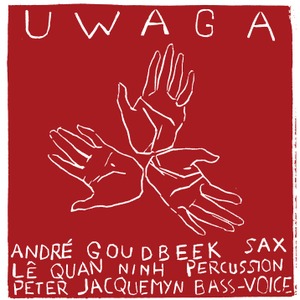

 Buy Now
Buy Now



